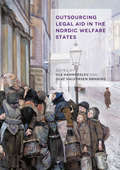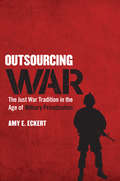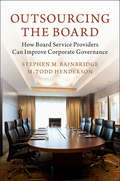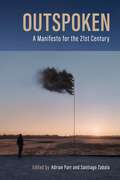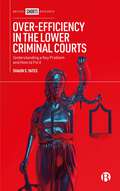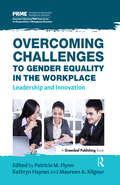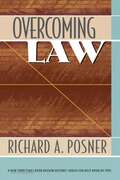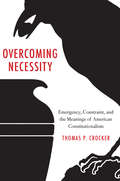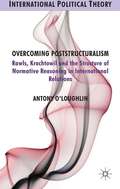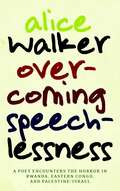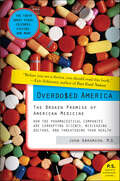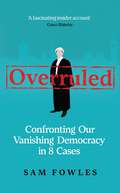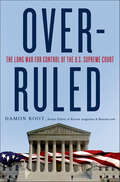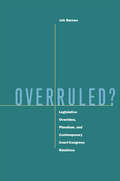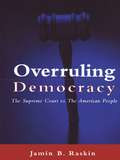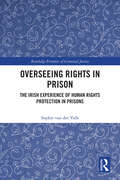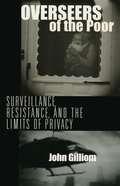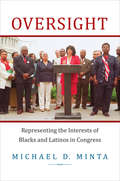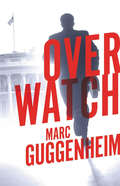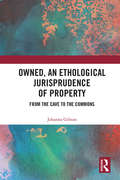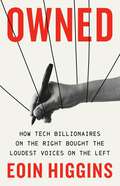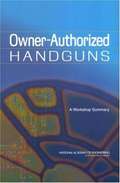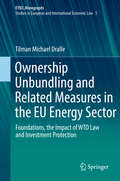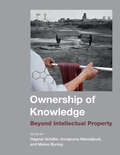- Table View
- List View
Outsourcing Legal Aid in the Nordic Welfare States
by Olaf Halvorsen Rønning Ole HammerslevThis book is open access under a CC BY 4. 0 license. This edited collection provides a comprehensive analysis of the differences and similarities between civil legal aid schemes in the Nordic countries whilst outlining recent legal aid transformations in their respective welfare states. Based on in-depth studies of Norway, Sweden, Finland, Denmark, and Iceland, the authors compare these cases with legal aid in Europe and the US to examine whether a single, unique Nordic model exists. Contextualizing Nordic legal aid in relation to welfare ideology and human rights, Hammerslev and Halvorsen R#65533;nning consider whether flaws in the welfare state exist, and how legal aid affects disadvantaged citizens. Concluding that the five countries all have very different legal aid schemes, the authors explore an important general trend: welfare states increasingly outsourcing legal aid to the market and the third sector through both membership organizations and smaller voluntary organizations. A methodical and compassionate text, this book will be of special interest to scholars and students of the criminal justice, the welfare state, and the legal aid system.
Outsourcing War: The Just War Tradition in the Age of Military Privatization
by Amy E. EckertRecent decades have seen an increasing reliance on private military contractors (PMCs) to provide logistical services, training, maintenance, and combat troops. In Outsourcing War, Amy E. Eckert examines the ethical implications involved in the widespread use of PMCs, and in particular questions whether they can fit within customary ways of understanding the ethical prosecution of warfare. Her concern is with the ius in bello (right conduct in war) strand of just war theory. Just war theorizing is generally built on the assumption that states, and states alone, wield a monopoly on the legitimate use of force. Who holds responsibility for the actions of PMCs? What ethical standards might they be required to observe? How might deviations from such standards be punished? The privatization of warfare poses significant challenges because of its reliance on a statist view of the world. Eckert argues that the tradition of just war theory—which predates the international system of states—can evolve to apply to this changing world order. With an eye toward the practical problems of military command, Eckert delves into particular cases where PMCs have played an active role in armed conflict and derives from those cases the modifications necessary to apply just principles to new agents in the landscape of war.
Outsourcing the Board: How Board Service Providers Can Improve Corporate Governance
by Stephen M. Bainbridge M. Todd HendersonIn this groundbreaking work, Stephen M. Bainbridge and M. Todd Henderson change the conversation about corporate governance by examining the origins, roles, and performance of boards with a simple question in mind: Why does the law require governance to be delivered through individual board members? While tracing the development of boards from quasi-political bodies through the current “monitoring” role, the authors find the reasons for this requirement to be wanting. Instead, they propose that corporations be permitted to hire other business associations – known as “Board Service Providers” or BSPs – to provide governance services. Just as corporations hire law firms, accounting firms, and consulting firms, so too should they be permitted to hire governance firms, a small change that will dramatically increase board accountability and enable governance to be delivered more efficiently. Outsourcing the Board should be read by academics, policymakers, and those within the corporations that will benefit from this change.
Outspoken: A Manifesto for the Twenty-First Century (Outspoken)
by Adrian Parr and Santiago ZabalaIn a world of increasing right-wing populism, global capitalism, and a climate emergency, leading thinkers come together to interrogate the meaning and practice of being outspoken. The violence, nativism, persecution, and social hostilities of the twenty-first century demand a call to order: philosophical and theoretical communities must commit their intellectual resources to confronting and articulating the structures, desires, and resentment driving the dismantling of democratic values. Action in the absence of understanding and political vision devoid of inclusive ideas are all the more vulnerable to taking a reactionary turn. Contributors to this volume challenge the return of fascism, dehumanization of immigrants, distrust of science, intolerance of fair and equitable economic models, and suspicion of inclusive political platforms. All, in their own way, tackle the burning question of how we might reimagine twenty-first-century life in the face of divisive forces. Outspoken includes essays by some of the world’s most radical thinkers – Rosi Braidotti, Henry A. Giroux, Amelia Jones, and Slavoj Žižek, among others – who together chart multiple progressive courses for political antagonism and social intervention.
Over-Efficiency in the Lower Criminal Courts: Understanding a Key Problem and How to Fix it
by Shaun S. YatesIn our pursuit of efficiency in the lower criminal courts, have we lost sight of quality justice? Through the critical examination of original stenographic data, this book demonstrates how an English Magistrates' courthouse often pursued managerial efficiency to the detriment of social justice and procedural due process values. Given that these courts process more than 95% of all criminal cases, this ‘over-efficiency’ problem has the capacity to cause significant social harm. Yates’ work concludes by providing socio-legal and criminological readers with ways to fix this over-efficiency problem. This accessible work is of value to policy makers and post-graduate students alike.
Overcoming Challenges to Gender Equality in the Workplace: Leadership and Innovation (The Principles for Responsible Management Education Series)
by Kathryn Haynes Patricia M. Flynn Maureen A. KilgourMany businesses and organizations are increasingly aware of the case for promoting gender equality, both within and outside their organizational boundaries. Evidence suggests that gender equality in the workplace boosts performance, and legal frameworks in many countries mandate specific action on gender inequality in the workplace. However, despite organizational policies on promoting equality and equal opportunities, there remain challenges to be overcome in many businesses, including throughout their supply chains. The book provides research rationales as to why responsible organizations must address the issue of gender equality in the workplace. It also presents case studies, action research and examples of good practices, describing how businesses and organizations are working to promote gender equality in various contexts. The book is designed to support the rationale for gender equality in business and organizations, providing evidence of implementation of gender equality in the workplace and advice on how to deal with and overcome challenges. It will be of interest to academics, employees, practitioners, policy-makers, businesses, institutions and organizations.
Overcoming Law
by Richard A. PosnerLegal theory must become more factual and empirical and less conceptual and polemical, Richard Posner argues in this wide-ranging new book. The topics covered include the structure and behavior of the legal profession; constitutional theory; gender, sex, and race theories; interdisciplinary approaches to law; the nature of legal reasoning; and legal pragmatism. Posner analyzes, in witty and passionate prose, schools of thought as different as social constructionism and institutional economics, and scholars and judges as different as Bruce Ackerman, Robert Bork, Ronald Dworkin, Catharine MacKinnon, Richard Rorty, and Patricia Williams. He also engages challenging issues in legal theory that range from the motivations and behavior of judges and the role of rhetoric and analogy in law to the rationale for privacy and blackmail law and the regulation of employment contracts. Although written by a sitting judge, the book does not avoid controversy; it contains frank appraisals of radical feminist and race theories, the behavior of the German and British judiciaries in wartime, and the excesses of social constructionist theories of sexual behavior. Throughout, the book is unified by Posner's distinctive stance, which is pragmatist in philosophy, economic in methodology, and liberal (in the sense of John Stuart Mill's liberalism) in politics. Brilliantly written, eschewing jargon and technicalities, it will make a major contribution to the debate about the role of law in our society.
Overcoming Necessity: Emergency, Constraint, and the Meanings of American Constitutionalism
by Thomas P. CrockerAn argument for why emergencies are no excuse for extralegal action by presidents Using emergency as a cause for action ultimately leads to an almost unnoticed evolution in the political understanding of presidential powers. The Constitution, however, was designed to function under “states of exception,” most notably through the separation of powers, and provides ample internal checks on emergency actions taken under claims of necessity. Thomas Crocker urges Congress, the courts, and other bodies to put those checks into practice.
Overcoming Poststructuralism
by Antony O'LoughlinThrough the use of a poststructuralist perspective, Antony O'Loughlin challenges the most basic tenets of International Relations Theory and deploys Rawlsian ideas of public reason in conjunction with Kratochwil's conceptions of practical reason in order to put forward a theory that overcomes the challenges posed by poststructuralism
Overcoming Speechlessness: A Poet Encounters the Horror in Rwanda, Eastern Congo, and Palestine/Israel
by Alice WalkerIn 2006, Alice Walker, working with Women for Women International, visited Rwanda and the eastern Congo to witness the aftermath of the genocide in Kigali. Invited by Code Pink, an antiwar group working to end the Iraq War, Walker traveled to Palestine/Israel three years later to view the devastation on the Gaza Strip. Here is her testimony.Bearing witness to the depravity and cruelty, she presents the stories of the individuals who crossed her path and shared their tales of suffering and courage. Part of what has happened to human beings over the last century, she believes, is that we have been rendered speechless by unusually barbaric behavior that devalues human life. We have no words to describe what we witness. Self-imposed silence has slowed our response to the plight of those who most need us, often women and children, but also men of conscience who resist evil but are outnumbered by those around them who have fallen victim to a belief in weapons, male or ethnic dominance, and greed.
Overcoming the Retributive Nature of the Israeli-Palestinian Conflict
by Thomas L. Saaty Luis G. Vargas H. J. Zoffer Amos GuioraThis book presents an interdisciplinary approach to conflict solution focusing on a very specific type of conflict, retributive conflicts . It is unique in the treatment of these and how relative measurement is used to find equilibrium solutions. The authors present an alternative process to address the Israeli-Palestinian conflict. They do so in two ways that are different from past efforts. The first is by formally structuring the conflict and the second is the manner in which discussions were conducted and conclusions drawn. The approach will help create a solution and provide negotiators with a unique pathway to consider the thorny issues and corresponding concessions underlying the deliberations, together with their implementation. The Analytic Hierarchy Process (AHP) provides a way to conflict solution with the participation of negotiators for the parties. It is a positive approach that makes it possible to reason and express feelings and judgments with numerical intensities to derive priorities. With the assistance of panels of Israeli participants and Palestinian participants brought together in 2006 to 2017, AHP was applied for the first time in a group setting to the Palestinian-Israeli conflict. The process makes it clear that moderation in different degrees by both sides is essential to arrive at acceptable agreements on concessions proposed and agreed upon by both sides.
Overdosed America: The Broken Promise of American Medicine
by John Abramson“Overdosed America reveals the greed and corruption that drive health care costs skyward and now threaten the public health. Before you see a doctor, you should read this book.” —Eric Schlosser, author of Fast Food NationUsing the examples of Vioxx, Celebrex, cholesterol-lowering statin drugs, and anti-depressants, Overdosed America shows that at the heart of the current crisis in American medicine lies the commercialization of medical knowledge itselfFor twenty years, John Abramson, M.D., cared for patients of all ages in a small town north of Boston. But increasingly his role as family doctor was undermined as pressure mounted to use the latest drugs and high-tech solutions for nearly every problem. Drawing on his background in statistics and health policy research, he began to investigate the radical changes that were quietly taking place in American medicine.At the heart of the crisis, he found, lies the changed purpose of medical knowledge—from seeking to optimize health to searching for the greatest profits. The lack of transparency that has become normal in commercially sponsored medical research now taints the scientific evidence published in even our most prestigious medical journals. And unlike the recent scandals in other industries that robbed Americans of money and jobs, this one is undermining our health.Commercial distortion pervades the information that doctors rely upon to guide the prevention and treatment of common health problems, from heart disease to stroke, osteoporosis, diabetes, and osteoarthritis. The good news, as Dr. Abramson explains, is that the real scientific evidence shows that many of the things that you can do to protect and preserve your own health are far more effective than what the drug companies' top-selling products can do for you—which is why the drug companies work so hard to keep this information under wraps.In what is sure to be one of the most important and eye-opening books you or your doctor will ever read, John Abramson offers conclusive evidence that American medicine has broken its promise to best improve our health and is squandering more than $500 billion each year in the process.
Overruled: Confronting Our Vanishing Democracy in 8 Cases
by Sam Fowles&‘A fascinating insider account&’ Grace Blakeley British democracy is on trial. We can no longer hold our leaders to account; the state has too much power; and the truth doesn&’t matter at all. Those we voted into government have nothing but contempt for the democratic system that got them there. When the Prime Minister illegally prorogued Parliament, barrister Sam Fowles was part of the team that took him to court, and won. The scenes of the police violently restraining women at a vigil for Sarah Everard shook the nation. In a high-profile parliamentary inquiry, Fowles proved the Met&’s actions fundamentally breached our right to protest. For decades, the Post Office pursued criminal prosecutions against its own employees, knowing the evidence was dodgy all along. Fowles helped reveal the rot at the heart of a trusted national institution. We shouldn&’t have to take our rulers to court just to get them to follow the rules. At a crucial juncture for British governance, Fowles urges us not to take our freedoms for granted.
Overruled: The Long War for Control of the U.S. Supreme Court
by Damon RootFrom Damon Root, a senior editor of Reason magazine, Overruled: The Long War for Control of the U.S. Supreme Court is “the most thorough account of the libertarian-conservative debate over judicial review…a valuable guide to both the past and the potential future of these important issues” (The Washington Post).Should the Supreme Court defer to the will of the majority and uphold most democratically enacted laws? Or does the Constitution empower the Supreme Court to protect a broad range of individual rights from the reach of lawmakers? In this timely and provocative book, Damon Root traces the long war over judicial activism and judicial restraint from its beginnings in the bloody age of slavery, the Civil War, and Reconstruction to its central role in today’s blockbuster legal battles over gay rights, gun control, and health care reform.It’s a conflict that cuts across the political spectrum in surprising ways and makes for some unusual bedfellows. Judicial deference is not only a touchstone of the Progressive left, for example, it is also a philosophy adopted by many members of the modern right. But many libertarians have no patience with judicial restraint and little use for majority rule. They want the courts and judges to police the other branches of government, and expect Justices to strike down any state or federal law that infringes on their bold constitutional agenda of personal and economic freedom.Overruled is the story of two competing visions, each one with its own take on what role the government and the courts should play in our society, a fundamental debate that goes to the very heart of our constitutional system.
Overruled?: Legislative Overrides, Pluralism, and Contemporary Court-Congress Relations
by Jeb BarnesSince the mid-1970s, Congress has passed hundreds of overrides—laws that explicitly seek to reverse or modify judicial interpretations of statutes. Whether front-page news or not, overrides serve potentially vital functions in American policy-making. Federal statutes—and court cases interpreting them—often require revision. Some are ambiguous, some conflict, and others are obsolete. Under these circumstances, overrides promise Congress a means to repair flawed statutes, reconcile discordant court decisions, and reverse errant judicial interpretations. Overrides also allow dissatisfied litigants to revisit issues and raise concerns in Congress that courts have overlooked. Of course, promising is one thing and delivering is quite another. Accordingly, this book asks: Do overrides, in fact, effectively clarify the law, reverse objectionable judicial statutory interpretations, and broaden deliberation on contested issues? The answers provide new insights into the complex role of overrides in U.S. policy-making and in the politics of contemporary court-Congress relations.
Overruling Democracy: The Supreme Court versus The American People
by Jamin B. RaskinThe Supreme Court has recently issued decisions announcing that citizens have neither a constitutional right to vote, nor the right to an education. Conservative judges have continually disavowed claims to any rights not specifically mentioned in the Constitution. In "Overruling Democracy, " celebrated law professor Jamin B. Raskin, argues that we need to develop a whole new set of rights, through amendments or court decisions, that revitalize and protect the democracy of everyday life. Detailing specific cases through interesting narratives, "Overruling Democracy" describes the transgressions of the Supreme Court against the Constitution and the people - and the faulty reasoning behind them -- and lays out the plan for the best way to back a more democratic system.
Overseeing Rights in Prison: The Irish Experience of Human Rights Protection in Prisons (Routledge Frontiers of Criminal Justice)
by Sophie van der ValkDrawing on Ireland as its primary case study, this book is an in- depth critical examination of how rights protection bodies and mechanisms are experienced by those in prison in Ireland.Through its analysis of the Irish experience, the book considers the implementation of, and challenges faced by, human rights protection within the prison context, and explores some of the reforms that Ireland has undertaken in this area over the past 15 years, including the introduction of a new complaint system and establishment of an Office of the Inspector of Prisons. Using a wealth of information gathered through interviews and surveys of participants in three male prisons, the book sets out personal experiences of such mechanisms and identifies the key barriers to effective rights protection.Offering a detailed presentation of the international framework for the protection of prisoners’ rights through oversight mechanisms, and proposing methods for overcoming common barriers, Overseeing Rights in Prison: The Irish Experience of Human Rights Protection in Prisons will be of interest to students and scholars of criminology, particularly in relation to prisons and human rights.
Overseers of the Poor: Surveillance, Resistance, and the Limits of Privacy
by John GilliomIn Overseers of the Poor, John Gilliom confronts the everyday politics of surveillance by exploring the worlds and words of those who know it best-the watched. Arguing that the current public conversation about surveillance and privacy rights is rife with political and conceptual failings, Gilliom goes beyond the critics and analysts to add fresh voices, insights, and perspectives.
Oversight: Representing the Interests of Blacks and Latinos in Congress
by Michael D. MintaOversight answers the question of whether black and Latino legislators better represent minority interests in Congress than white legislators, and it is the first book on the subject to focus on congressional oversight rather than roll-call voting. In this important book, Michael Minta demonstrates that minority lawmakers provide qualitatively better representation of black and Latino interests than their white counterparts. They are more likely to intervene in decision making by federal agencies by testifying in support of minority interests at congressional oversight hearings. Minority legislators write more letters urging agency officials to enforce civil rights policies, and spend significant time and effort advocating for solutions to problems that affect all racial and ethnic groups, such as poverty, inadequate health care, fair housing, and community development. In Oversight, Minta argues that minority members of Congress act on behalf of broad minority interests--inside and outside their districts--because of a shared bond of experience and a sense of linked fate. He shows how the presence of black and Latino legislators in the committee room increases the chances that minority perspectives and concerns will be addressed in committee deliberations, and also how minority lawmakers are effective at countering negative stereotypes about minorities in policy debates on issues like affirmative action and affordable housing.
Overwatch
by Marc GuggenheimA young CIA lawyer uncovers a dangerous worldwide conspiracy, masterminded by forces within the US intelligence community. Alex Garnett has spent his life in the shadow of his father, a former Chief of Staff and Solicitor General to two presidents who's been responsible for getting Alex every job he ever had, including his latest: attorney for the CIA. However, a seemingly routine litigation leads to a series of unexpected events, including poison, kidnapping, torture and murder. As casualties pile up, it becomes clear Alex is the final target in someone's blood-soaked attempts to cover their tracks. With the help of a neurotic hacker, Alex unravels a conspiracy older than the CIA itself. The trail of clues reveals the presence of unseen forces that are bringing this nation to the brink of war--and Alex's life is only one of many in danger.a massive government and global conspiracy that dates back to the founding of the CIA or be buried with the trail of evidence he's unwittingly discovered. As the nation ticks closer to a costly, dangerous war, Marcus realizes there's much more at stake than the life of one CIA lawyer.
Owned, An Ethological Jurisprudence of Property: From the Cave to the Commons
by Johanna GibsonThis book draws upon domestication science to undertake a radical reappraisal of the jurisprudence of property and intellectual property. Bringing together animal studies and legal philosophy, it articulates a critique of dominant property models and relationships from the perspective of cognitive ethology, domestication science and animal behaviour. In doing so, a radical new picture of property emerges. Focusing on the emergence of property models through prevailing ideas of human domestication and settlement, the book challenges the anthropocentrism that informs standard approaches to ownership and to authorship. Utilising a wide range of examples from ethology and animal studies, the book thus rethinks the very nature of property as uniquely human. This highly original contribution to the fields of property and intellectual property will appeal not only to legal scholars in these areas, as well as in animal law, but also to legal theorists and others working in the social sciences with interests in posthumanism and animal studies.
Owned: How Tech Billionaires on the Right Bought the Loudest Voices on the Left
by Eoin HigginsA &“devastating&” (Nation) examination of how a cabal of tech-billionaires is colluding with once-idealistic journalists to create an entirely new media landscapeOwned is the story of the underreported and growing collusion between new wealth and new journalism. In recent years, right-wing billionaires like Elon Musk, Peter Thiel, Marc Andreessen, and David Sacks have turned to media as their next investment and source of influence. Their cronies are Glenn Greenwald and Matt Taibbi—once known as idealistic and left-leaning voices, now beneficiaries of Silicon Valley largesse. Together, this new alliance aims to exploit the failings of traditional journalism and undermine the very idea of an independent and fact-based fourth estate.Owned examines how this shift has allowed spectacularly wealthy reactionaries to pursue their ultimate goal of censoring critics so to further their own business interests—and personal vendettas—entirely unimpeded while also advancing a toxic and antidemocratic ideology. A rich history of the decades-long rise of this new right-wing alternative media takeover, Owned follows the money, names names, and offers a chilling portrait of a future social media and news landscape. It is a biting exposé of journalistic greed, tech-billionaire ambition, and a lament for a disappearing free press.
Owner-Authorized Handguns: A Workshop Summary
by Lance A. Davis Greg PearsonThe feasibility and potential impact of so-called smart handguns has generated considerable public interest and debate. This report summarizes a June 2002 workshop at the National Academy of Engineering that examined three related issues: the state of technology for owner-authorized handguns; the role of product liability in the development and marketing of such firearms; and the potential impact of these smart guns on health and crime. Smart-gun technology has the potential to prevent unintended or undesirable uses of handguns, such as accidental shootings; the shooting of police officers by assailants using the officers' own weapons; suicides; homicides with stolen handguns; and other gun-related crimes. However, information presented at the workshop suggests that considerably more research is needed to bring a reliable and commercially viable product to the marketplace. The report also notes that the impact of smart-guns will be influenced by legal issues, human behavior, economic conditions, and other factors.
Ownership Unbundling and Related Measures in the EU Energy Sector: Foundations, The Impact Of Wto Law And Investment Protection (European Yearbook of International Economic Law #5)
by Tilman Michael DralleThis book provides the first comprehensive analysis of unbundling and, in particular, ownership unbundling policies from the perspective of international economic law. It does so by focusing on the prominent example of the EU’s energy sector and its Third Energy Package. Unbundling has become an increasingly crucial competition instrument in network-bound industries worldwide. It is designed to ensure access to bottleneck infrastructures on fair and non-discriminatory terms and thus to suppress the anti-competitive potential deriving from vertical integration in natural monopoly situations. While promoting important public policy objectives, unbundling policies have also raised a number of legal issues. This book analyzes how international economic law limits the adoption and maintenance of unbundling and related measures and also outlines how international trade law can play a ‘positive’ role in this field. As a result, it provides a valuable reference for academics, practitioners and policy-makers.
Ownership of Knowledge: Beyond Intellectual Property
by Dagmar Schäfer, Annapurna Mamidipudi, and Marius BuningA framework for knowledge ownership that challenges the mechanisms of inequality in modern society.Scholars of science, technology, medicine, and law have all tended to emphasize knowledge as the sum of human understanding, and its ownership as possession by law. Breaking with traditional discourse on knowledge property as something that concerns mainly words and intellectual history, or science and law, Dagmar Schäfer, Annapurna Mamidipudi, and Marius Buning propose technology as a central heuristic for studying the many implications of knowledge ownership. Toward this end, they focus on the notions of knowledge and ownership in courtrooms, workshops, policy, and research practices, while also shedding light on scholarship itself as a powerful tool for making explicit the politics inherent in knowledge practices and social order. The book presents case studies showing how diverse knowledge economies are created and how inequalities arise from them. Unlike scholars who have fragmented this discourse across the disciplines of anthropology, sociology, and history, the editors highlight recent developments in the emerging field of the global history of knowledge—as science, as economy, and as culture. The case studies reveal how notions of knowing and owning emerge because they reciprocally produce and determine each other&’s limits and possibilities; that is, how we know inevitably affects how we can own what we know; and how we own always impacts how and what we are able to know.ContributorsDagmar Schäfer, Annapurna Mamidipudi, Cynthia Brokaw, Marius Buning, Viren Murthy, Marjolijn Bol, Amy E. Slaton, James Leach, Myles W. Jackson, Lissant Bolton, Vivek S. Oak, Jörn Oeder
